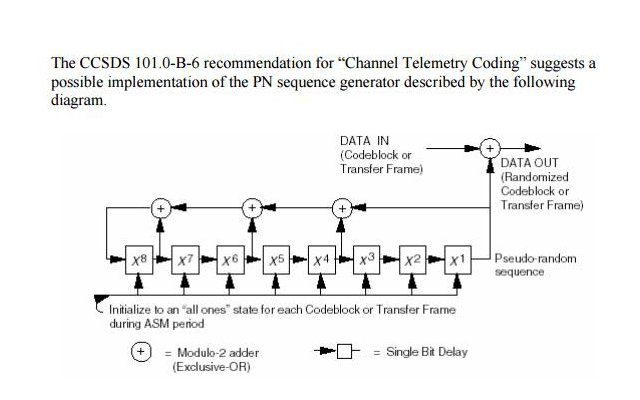on
De-randomization of the data
One of the missing things on the last chapter was the frame data de-randomization. The data inside the frame (excluding the sync word) is randomized by a generator polynomial. This is done because of few things:
- Pseudo-random Symbols distribute better the energy in the spectrum
- Avoids “line-polarization” effect when sending a continuous stream of 1’s
- Better Clock Recovery due more changes in symbol polarity
CCSDS has a standard Polynomial as well, and the image below shows how to generate the pseudo-random bistream:

The PN Generator polynomial (as shown in the LRIT spec) is x^8 + x^7 + x^5 + x^3 + 1. You can check several PN Sequence Generators on the internet, but since the repeating period of this PN is 255 bytes and we’re xor’ing with our bytestream I prefer to make a lookup table with all the 255 byte sequence and then just xor (instead generating and xor). Here is the 255 byte PN:
char pn[255] = {
0xff, 0x48, 0x0e, 0xc0, 0x9a, 0x0d, 0x70, 0xbc,
0x8e, 0x2c, 0x93, 0xad, 0xa7, 0xb7, 0x46, 0xce,
0x5a, 0x97, 0x7d, 0xcc, 0x32, 0xa2, 0xbf, 0x3e,
0x0a, 0x10, 0xf1, 0x88, 0x94, 0xcd, 0xea, 0xb1,
0xfe, 0x90, 0x1d, 0x81, 0x34, 0x1a, 0xe1, 0x79,
0x1c, 0x59, 0x27, 0x5b, 0x4f, 0x6e, 0x8d, 0x9c,
0xb5, 0x2e, 0xfb, 0x98, 0x65, 0x45, 0x7e, 0x7c,
0x14, 0x21, 0xe3, 0x11, 0x29, 0x9b, 0xd5, 0x63,
0xfd, 0x20, 0x3b, 0x02, 0x68, 0x35, 0xc2, 0xf2,
0x38, 0xb2, 0x4e, 0xb6, 0x9e, 0xdd, 0x1b, 0x39,
0x6a, 0x5d, 0xf7, 0x30, 0xca, 0x8a, 0xfc, 0xf8,
0x28, 0x43, 0xc6, 0x22, 0x53, 0x37, 0xaa, 0xc7,
0xfa, 0x40, 0x76, 0x04, 0xd0, 0x6b, 0x85, 0xe4,
0x71, 0x64, 0x9d, 0x6d, 0x3d, 0xba, 0x36, 0x72,
0xd4, 0xbb, 0xee, 0x61, 0x95, 0x15, 0xf9, 0xf0,
0x50, 0x87, 0x8c, 0x44, 0xa6, 0x6f, 0x55, 0x8f,
0xf4, 0x80, 0xec, 0x09, 0xa0, 0xd7, 0x0b, 0xc8,
0xe2, 0xc9, 0x3a, 0xda, 0x7b, 0x74, 0x6c, 0xe5,
0xa9, 0x77, 0xdc, 0xc3, 0x2a, 0x2b, 0xf3, 0xe0,
0xa1, 0x0f, 0x18, 0x89, 0x4c, 0xde, 0xab, 0x1f,
0xe9, 0x01, 0xd8, 0x13, 0x41, 0xae, 0x17, 0x91,
0xc5, 0x92, 0x75, 0xb4, 0xf6, 0xe8, 0xd9, 0xcb,
0x52, 0xef, 0xb9, 0x86, 0x54, 0x57, 0xe7, 0xc1,
0x42, 0x1e, 0x31, 0x12, 0x99, 0xbd, 0x56, 0x3f,
0xd2, 0x03, 0xb0, 0x26, 0x83, 0x5c, 0x2f, 0x23,
0x8b, 0x24, 0xeb, 0x69, 0xed, 0xd1, 0xb3, 0x96,
0xa5, 0xdf, 0x73, 0x0c, 0xa8, 0xaf, 0xcf, 0x82,
0x84, 0x3c, 0x62, 0x25, 0x33, 0x7a, 0xac, 0x7f,
0xa4, 0x07, 0x60, 0x4d, 0x06, 0xb8, 0x5e, 0x47,
0x16, 0x49, 0xd6, 0xd3, 0xdb, 0xa3, 0x67, 0x2d,
0x4b, 0xbe, 0xe6, 0x19, 0x51, 0x5f, 0x9f, 0x05,
0x08, 0x78, 0xc4, 0x4a, 0x66, 0xf5, 0x58
};
And for de-randomization just xor’it with the frame (excluding the 4 byte sync word):
for (int i=0; i<1020; i++) {
decodedData[i] ^= pn[i%255];
}
Now you should have the de-randomized frame.
